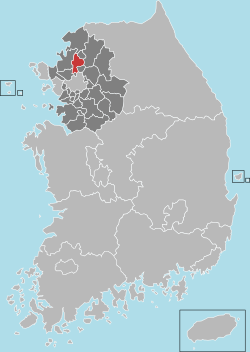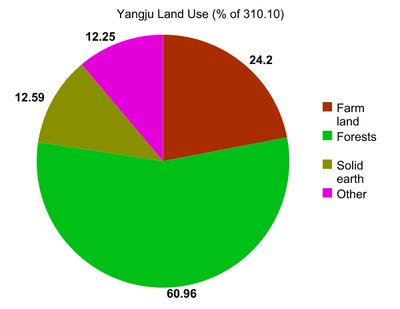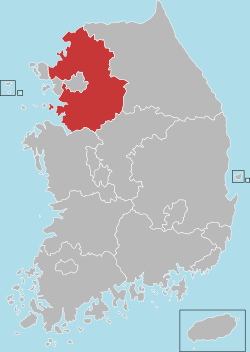Yangju
Yangju (Korean pronunciation: [jaŋ.dʑu]) is a city in Gyeonggi Province, South Korea. Yangju is located south of Dongducheon and north of Uijeongbu, not far from Seoul.
Yangju 양주시 | |
|---|---|
Municipal City | |
| Korean transcription(s) | |
| • Hangul | 양주시 |
| • Hanja | 楊州市 |
| • Revised Romanization | Yangju-si |
| • McCune-Reischauer | Yangju-si |
 Flag | |
 Location in South Korea | |
| Country | |
| Region | Sudogwon |
| Administrative divisions | 1 eup, 4 myeon, 6 dong |
| Area | |
| • Total | 310.1 km2 (119.7 sq mi) |
| Population (2009 Dec) | |
| • Total | 189,492 |
| • Density | 611.1/km2 (1,583/sq mi) |
| • Dialect | Seoul |
History
- 1395 - Renamed to Yangju.
- January 1, 1963 - Uijeongbu is separated and becomes a city.
- April 1, 1980 - Namyangju is separated and becomes a city.
- July 1, 1981 - Dongducheon is separated and becomes a city.
Attractions
Yangju is home to the Jangheun Art Gallery, which features six exhibition halls and includes subsidiary facilities such as outdoor performances and outdoor sculptures. Yangju also has an astronomical observatory and planetarium that is open to the public.[1] The city also used to have a walking Dae Jang Geum Theme Park featuring the film locations and constructed sets for the MBC Korean drama Daejanggeum, but this was closed permanently in late 2011 due to persistent vandalism.[2]
Yangju also hosts the yearly Yangju Snow Festival.[3] The city has a few mountains, including Gamaksan and Bulgoksan, which can be hiked. Part of Bukhansan is located within Yangju.
Transportation
There are three subway stations covered by the Seoul Metropolitan Subway, and it takes about 70 minutes from the center of Seoul to the first station located in Yangju. Also, there are numerous public bus services running between Seoul, Uijeongbu, and up to Yeoncheon, where the border with North Korea is crossed by the Demilitarized Military Zone.
Bus
- City Bus: Yangju City Bus, Yangju Village Bus
- Intercity Bus: Yangju Intercity Bus Station
Road
Highway
- Seoul Ring Expressway: Songchu IC, Sapsan Tunnel
- Sejong–Pocheon Expressway: Okjeong IC, Yangju IC
- Highway Route No. 400
Route
Local Roads
Sister Cities




Statistics

References
- "- Gyeonngi Tourism Organization". en.ggtour.or.kr.
- "- Official Korea Tourism Organization". english.visitkorea.or.kr.
- "- Official Korea Tourism Organization". english.visitkorea.or.kr.
